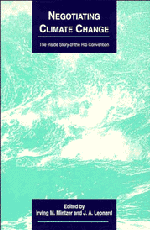Book contents
- Frontmatter
- Contents
- Acknowledgements
- Commonly Used Acronyms
- Foreword
- Part I Background
- Part II Views from Within the Ring
- Part III The Outside Edges In
- 11 Some Comments on the INC Process
- 12 A View from the Ground Up
- Part IV Prospects for the Future
- Appendix: The Framework Convention on Climate Change
- Index
12 - A View from the Ground Up
Published online by Cambridge University Press: 01 June 2011
- Frontmatter
- Contents
- Acknowledgements
- Commonly Used Acronyms
- Foreword
- Part I Background
- Part II Views from Within the Ring
- Part III The Outside Edges In
- 11 Some Comments on the INC Process
- 12 A View from the Ground Up
- Part IV Prospects for the Future
- Appendix: The Framework Convention on Climate Change
- Index
Summary
Introduction
The Framework Convention on Climate Change has been signed by over 150 states and, as of December 31, 1993, has been ratified by more than fifty countries. It will enter into force in 1994. Environmental non-governmental organizations (NGOs) from the North and South contributed in a substantial manner to these intergovernmental negotiations. They continue to engage in the climate negotiations, despite the limits of the existing text. The NGOs have a common aim: that the process should produce additional commitments leading to real emissions reductions. Through the implementation of such commitments NGOs hope that the objectives of the Convention itself—i.e., stabilization of greenhouse gas concentrations in the atmosphere at levels that do not threaten dangerous anthropogenic modification of the global climate system—will be achieved.
Representatives of numerous NGOs were officially present as observers to the plenary sessions of the Intergovernmental Negotiating Committee for a Framework Convention on Climate Change (INC). Only a few participated in official government delegations. Nonetheless, it was widely accepted by all the parties involved that environmental NGOs played a key role in the negotiations, both formally and informally.
From both a historical and a current perspective, developed countries are responsible for the bulk of greenhouse gas (GHG) emissions. NGOs have criticized the Framework Convention on Climate Change (referred to herein as the Climate Convention) for the absence of any serious commitment to emissions reductions by these countries.
- Type
- Chapter
- Information
- Negotiating Climate ChangeThe Inside Story of the Rio Convention, pp. 239 - 274Publisher: Cambridge University PressPrint publication year: 1994
- 8
- Cited by

